The recent news
June 14, 2023
Conferences
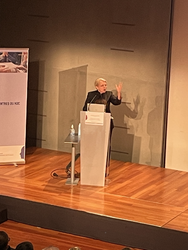
🌐follow Marie-Anne Frison-Roche on LinkedIn
🌐subscribe to the Newsletter MAFR Regulation, Compliance, Law
____
► Full Reference: M.-A. Frison-Roche, "L'esprit des Lois en matière de vigilance" ("Spirit of Law in Vigilance (Due Diligences) matters"), in Haut Conseil du Commissariat aux Comptes (H3C), Réalités et défis de la CSRD - Perspectives du devoir de vigilance, Paris, 14 June 2023.
____
🎥watch the video of a part of the speech (in French)
____
🧱read the description of the speeches of other speakers of this panel (in French)
____
The speech took place during the third-round table devoted to the Perspectives du devoir de vigilance (Perspectives of the duty of vigilance), the first round table having been devoted to the lessons that the DPEF can provide for the CSRD, and the second to the transposition work of the CSRD.
🧮See the full programme of this annual event (in French)
____
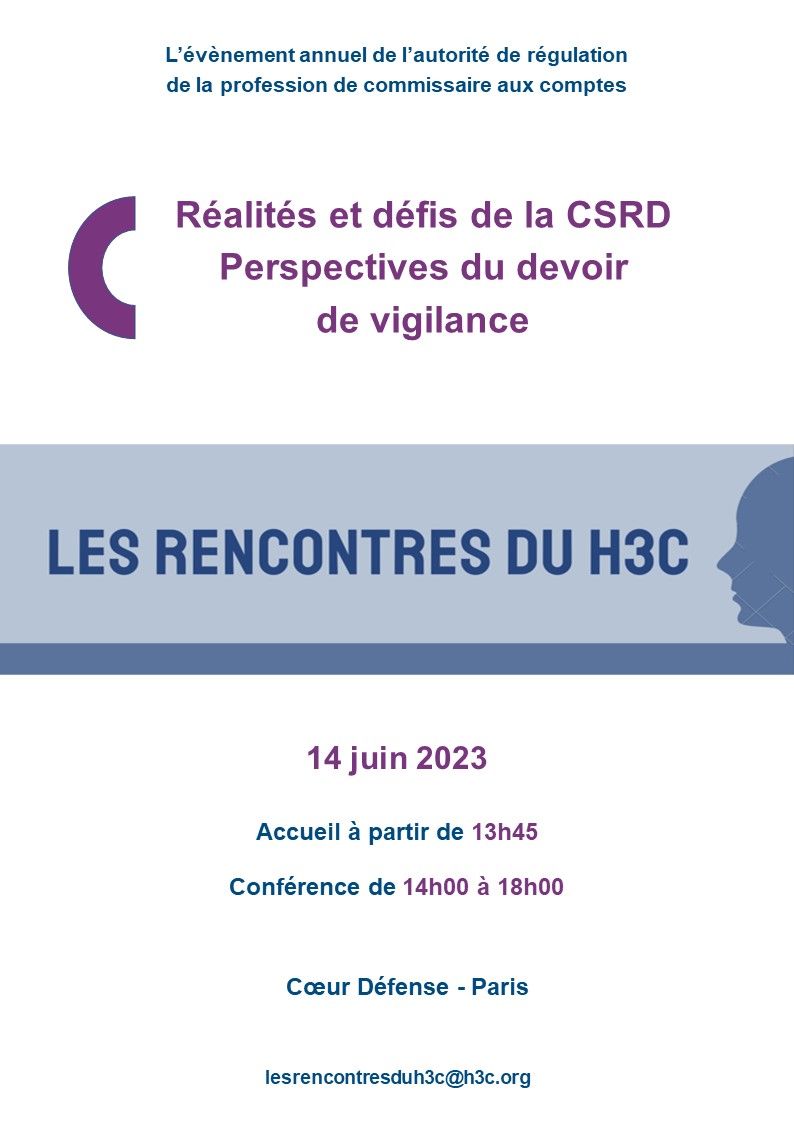
► English summary of the speech: In consideration of and in addition to what has been said, explained and even affirmed by other speakers, I have emphasised that 'vigilance" laws is not a 'regulation' like any other, but the leading edge of a very vast movement, Compliance Law, in which the 2017 French law is the driving force. For its application, the Judge, who is at the centre because of the will of the Legislator, is already taking into consideration the CS3D, the twin text of the CSRD.
The texts must not be seen in isolation. If we isolate them from each other, they become almost incomprehensible, their meaning appearing uncertain, even threatening: we need to understand the spirit of these texts, which are indeed new, because they aim to provide answers to the new world we have entered. We must all rejoice in this political ambition, which is taking a legal form, and work to make it efficient: Legislators, companies, auditors, Regulators and Judges.
If we do not stop at the letter, which would be to reduce Compliance to conformity, whereas Compliance Law, particularly Vigilance, is the extension of Regulation, finds its meaning in the Goals, we see that the French law of 2017, known as the "Vigilance law", which copies all the techniques of the French law known as "Sapin 2", gives goals simple to understand to the companies subject to the Legislator's will: detect and prevent environmental and human rights abuses in the value chains.
The logic is therefore Ex-Ante.
This Ex-Ante logic is retained by the CS3D directive.
The Judge is central to it. But the responsibility which the NGOs will ask him to trigger is itself an "Ex Ante responsibility", the Compliance trials being like "accountability" trials, to ensure that companies act in accordance with the Goals set by the Legislator.
This is transforming the role of the Judge, who must find effective solutions for the future. The discussion and the adversarial principle will become more important. Mediation will be encouraged. Stakeholders and the company will have to work together, and this method, which was intended by the Legislator for drawing up the vigilance plan, will be continued in the supporting legal proceedings.
This will also transform the company, and the role played by those who accredit the information on the company's actions and long-term strategies: auditors therefore have a central role to play.
________
June 14, 2023
Conferences
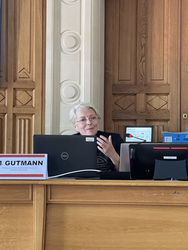
♾️follow Marie-Anne Frison-Roche on LinkedIn
♾️subscribe to the Newsletter MAFR Regulation, Compliance, Law
____
► Full Reference: M.-A. Frison-Roche, "Compliance et droit processuel" ("Compliance and Procedural Law"), in B. Deffains, M.-A. Frison-Roche and J.-B. Racine (dir.), Journal of Regulation & Compliance (JoRC) and University Panthéon-Assas (Paris II), Compliance : Obligation, devoir, pouvoir, culture (Compliance : obligation, duty, power, culture), University Panthéon-Assas, Salle des Conseils, 14 June 2023.
____
🧮See the full programme of this event
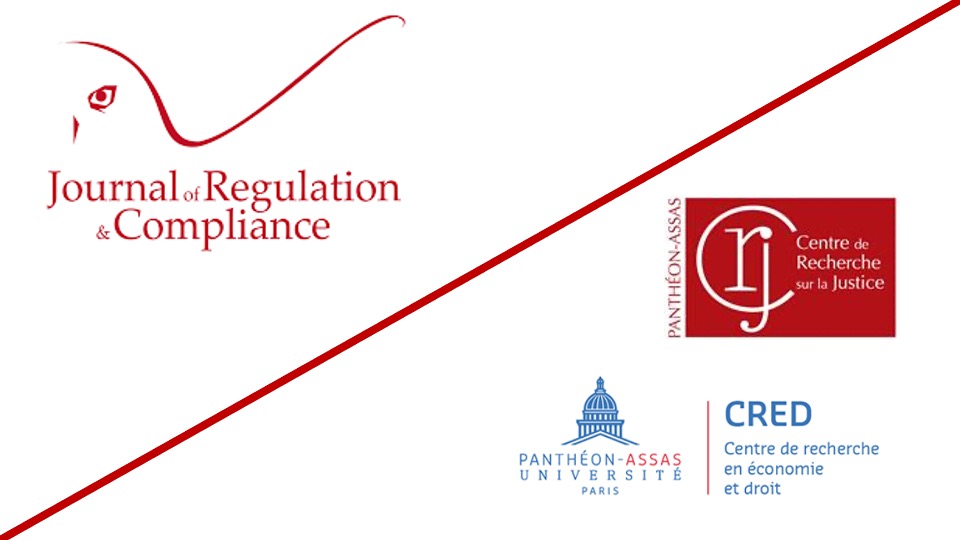
____
🎤see the other speech made during the first day of this symposium : "L'obligation de compliance, entre volonté et consentement : obligation sur obligation vaut" ("Compliance Obligation, between will and consent: obligation on obligation works")
____
► Summary of the conference: After referring to the chapter in the book Compliance Jurisdictionalisation, which deals more specifically with Procedural Law!footnote-2987, the conference is built around 5 developments, each of which represents a progression.
The first development relates to the fact that the relationship between Compliance Law and Procedural Law is very difficult because it is often said that they simply have nothing to do with each other, or that they have everything to dislike each other. This is because Compliance is often reduced to processes, and to the mechanical place that algorithms could take in it, in taking care of everything.
Compliance would even have the purpose and effect of ensuring that the company and its managers never come into contact with a judge, the public prosecutor being their best ally in this respect.
Secondly, I recalled the very common idea that Procedural Law is a kind of 'tribute' that the rule of Law demands, which certainly weighs down companies when compared with companies living in systems in which there's not not such a price.
But many stress that Procedural Law could become a model. This can be justified and technically anticipated because it has already happened in Regulation Law, and Compliance Law is the deployment of it!footnote-2988.
In the third stage, I worked on the alliance between the two, with the procedure (rather than the process) modifying compliance and thereby reinforcing it, evoking the way in which this can manifest itself technically!footnote-2989.
In the fourth step, I looked for what would be the "naturally appropriate procedure" for Compliance: one that takes into account the duration and the development of "solutions", to which the notion of "sustainability", which is central in the substantive Law of Compliance, refers.
In a fifth stage, and devoting more time to this, I have pointed out where innovation should be the strongest: the proof, the probatory obligation being the "part totale" ("total part") of the compliance obligation. This major issue will be the subject of a series of symposiums held in 2024.
________
June 13, 2023
Conferences
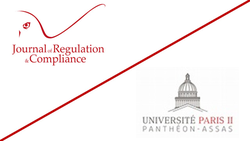
♾️ suivre Marie-Anne Frison-Roche sur LinkedIn
♾️s'abonner à la Newsletter MAFR Regulation, Compliance, Law
____
► Référence complète : M.-A. Frison-Roche, "L’obligation de compliance, entre volonté et consentement : obligation sur obligation vaut", in B. Deffains, M.-A. Frison-Roche et J.-B. Racine (dir.), Journal of Regulation & Compliance (JoRC) et Université Paris Panthéon-Assas, Compliance : Obligation, devoir, pouvoir, culture, Université Panthéon-Assas, Salle des Conseils, 13 juin 2023.
____
🎤consulter la présentation de l'autre conférence faite lors de la seconde journée de ce colloque : "Compliance et Droit processuel"
____
🧮Consulter le programme de cette manifestation
____
► Présentation de la conférence : Le Droit des contrats noue le "consentement" et la "volonté", puisque le consentement est ce qui manifeste la volonté d'une personne, en marque la liberté et l'engagement, en constitue la trace et la preuve. En 1995, j'ai montré que le Droit économique avait distingué le consentement et la volonté, pour rendre les consentements autonomes et en faire des marchés, notamment dans le Droit de la concurrence et le Droit financier📎!footnote-2980. Or, le consentement si on le transporte en objet, autonome, devient le signe d'une obéissance mécanique, ce qui produit des effets dont le système juridique, si l'on est dans un système libéral et démocratique, doit tenir compte d'une façon centrale. Le Droit économique lui-même doit mettre cela au centre, ce qu'il ne fait guère, notamment par la distinction, néfaste, des branches du Droit.
Puis en rendant hommage à Pierre Godé qui avait fait sa thèse sur la volonté📎!footnote-2982, j'ai montré en 2018 que les "consentements mécaniques" étaient la base de beaucoup d'industries dans l'espace numérique📎!footnote-2981. Les Autorités publiques de supervision et de régulation mis en place en matière de Compliance, par exemple en France la CNIL, ont eu pour mission et pour jurisprudence de sauvegarder ce lien entre le consentement et la volonté.
Mais la difficulté à comprendre le système général du Droit de la Compliance vient de la confusion souvent faite entre celui-ci et ce qui n'est qu'un de ses outils : la conformité. Or, la conformité est l'obligation pour un sujet de droit, certaines entreprises de donner à voir en Ex Ante qu'elles obéissent activement à la réglementation qui leur est applicable. J'ai montré en 2016📎!footnote-2983 que le Droit de la Compliance ne doit pas se définir par l'obéissance mécanique mais comme la compréhension de la Volonté du Législateur qui vise des Buts, l'entreprise contribuant à la concrétisation de ceux-ci.
Les entreprise qui sont sujets du Droit de la Compliance ne sont alors pas toutes les entreprises, ni celles qui seraient "coupables" par avance, mais celles qui "sont en position" d'atteindre les buts : les "entreprises cruciales", notion que j'ai proposée en 2006📎!footnote-2984. C'est donc dans une perspective systémique et en Ex Ante que le Droit de la Compliance se développe, le Droit de la Compliance étant le déploiement du Droit de la Régulation, comme je l'ai montré en 2017📎!footnote-2985.
Il demeure que les entreprises, qui entrent dans le commerce juridique par leur personnalité juridique, peuvent elles-aussi exprimer leur volonté et non pas seulement consentir. Elles le font non seulement dans la mise en œuvre, ce que la Volonté du Législateur leur demande, mais encore en édictant des Buts, là où se loge la normativité du Droit de la Compliance.
C'est là où l'on doit affirmer dans un nouvel adage : Obligation sur Obligation vaut.
En effet, si l'entreprise exerce sa puissance juridique non seulement sa capacité à obéir (consentement), ce qui est une puissance faible, mais encore en exerçant leur puissance pour l'effectivité, l'efficacité et l'efficience des Buts Monumentaux du Droit de la Compliance, les systèmes et les êtres humains qui y sont impliquées en sont les bénéficiaires.
C'est pourquoi dans une conception générale du "pouvoir" que j'ai dessinée pour rendre hommage à Emmanuel Gaillard qui avait consacré sa thèse à cette notion📎!footnote-2986, l'entreprise déploie sa volonté libre et autonome, le consentement, y compris celui des tiers qui dépendent d'elles, convergeant vers la concrétisation des buts. Le contrat devient l'outil premier.
Le sujet premier devient alors en théorie et en pratique l'articulation entre la Volonté du Législateur (la "réglementation" applicable) et la Volonté des entreprises cruciales. Ce point sera particulièrement développé lors de la conférence.
La dimension probatoire de la question sera plutôt développée le lendemain dans la conférence qui, dans le cadre de ce cycle portant sur L'Obligation de Compliance, portera sur Compliance et Droit processuel.
_____________________________
La conférence est construite en trois temps :
III. OBLIGATION SUR OBLIGATION VAUT
________
June 2, 2023
Conferences

🌐follow Marie-Anne Frison-Roche on LinkedIn
🌐subscribe to the Newsletter MAFR Regulation, Compliance, Law
____
► Full Reference: M.-A. Frison-Roche, Le rôle du Juge dans le déploiement du Droit de la Régulation en Droit de la Compliance (The role of the Judge in the deployment of Regulatory Law in Compliance Law), in Conseil d'État (French Administrative Supreme Court) and Cour de cassation (French Judiciaire Supreme Court of cassation), De la Régulation à la Compliance : quel rôle pour le Juge ? ("From Regulatory to Compliance : what role for the judge?"), speech constituting the "closing session" of the bi-annual joint symposium of the two High Courts, held at the Conseil d'Etat, Salle d'Assemblée générale, 2 June 2023.
The event was held in French.
____
🧮See the full programme of this event (in French)
____
🎥watch the interview given about the conclusion, done after the speech (in French)
____
🧮read the general programme of the manifestation (in French)
____
📚read the bibliographical dossier du participant. (participant's file made in French)
___
🎥watch the general introductory speechs of Didier-Roland Tabuteau, Vice-Président du Conseil d'Etat, de Christophe Soulard, Premier Président de la Cour de cassation, and of François Molins, Procureur général près la Cour de cassation ; and the interventions in the first session devoted to the path from the Regulatory to the Compliance with Marie-Anne Barbat-Layani, présidente de l'AMF, Jean-Yves Ollier, conseiller d'Etat, Daniel Calleja-Crespo, directeur général du service juridique de la Commission européenne andChristine Guegen, , première avocate générale de la chambre commerciale de la Cour de cassation
____
🎥watch the speechs in the second session devoted to the office of the judge with Vincent Vigneau, président de la chambre commerciale de la Cour de cassation, François Ancel, conseiller à la première chambre civile de la Cour de cassatin, Astrid Mignon-Colombet, avocate à la Cour, Lucien Rapp, professeur à Toulouse-Capitol and Alain Seban, conseiller d'Etat ; the speechs of the third session dedicated to the Compliance new frontiers, with Christophe Chantepy, président de la section du contentieux du Conseil d'Etat, Roch-Olivier Maistre, président de l'Arcom, Paul Nihoul, juge au Tribunal de l'Union européenne, Jean-François Bohnert, procureur de la République financier, Joëlle Tolédano, professeure émérite à Dauphine ; the final session with Marie-Anne Frison-Roche
____
🎥watch this final speech by Marie-Anne Frison-Roche, which formed the closing session of the event
____
🚧read the bilingual Working Paper used as basis for the article to be published later
____
____
► English presentation of this general conclusion: Having a definition of Compliance Law in mind, a definition around which there still seems to be so much dispute, is not required to understand that this Law is what will enable us to enter and deal with a new world and if this subject is so fascinating to young people who want to become lawyers, prosecutors, regulators or judges, even though they are not taught this subject, it is because they have understood that with Compliance Law they will be able to actively participate in this new world and build it. This is the way we want it to take it, with force and courage in a sort of collective adventure. In this way, the Judges have a monumental role to play, which is at the very heart of Compliance Law.
They will necessarily be so because demands and claims will converge on them from all sides, from Internet users, consumers, investors, associations and companies, and the Judge will have to respond. This has already started and is only just beginning. Judges must be prepared.
Four expectations are emerging as to what their role should be.
Firstly, judges must persist in their role as guardians of the Rule of Law, in a Compliance Law impregnated with technologies (algorithms) that could be described as insensitive.
Secondly, beyond this vital role as guardian of the Rule of Law, the Judge has a new role in the extraordinary deployment of Compliance Law, which is measured in terms of the novelty of the normative control it exercises, the commitments it supports, the remedies it finds and the sustainability it reinforces.
Thirdly, in the natural space of justice, the judge responds to parties who make claims of compliance, both as plaintiff and defendant, because the causes of compliance are systemic causes that deserve a new jurisdictional treatment.
Fourthly, given the novelty and scope of this innovative approach, all judges must converge in terms of content, qualifications, and methods if they are both to continue their traditional role as guardians of the Rule of Law and to be able to endure their new role, a dialogue in which they have so much to contribute to each other.
________
May 25, 2023
Conferences
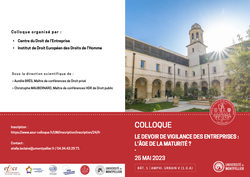
♾️ flollow Marie-Anne Frison-Roche on LinkedIn
♾️subscribe to the Newsletter MAFR Regulation, Compliance, Law
____
► Full Reference: M.-A. Frison-Roche, "Conclusions", in Ch. Maubernard et A. Brès (dir.), Institut de droit européen des droits de l'homme et Centre de droit de l'entreprise, Université de Montpellier, Le devoir de vigilance des entreprises : l'âge de la maturité?("The Entreprises duty of vigilance: the maturity age?") , Montpellier, May 25, 2023.
The conference is held in French.
____
🧮see the manifestation programme (in French)
___
🌐 read the report done on LinkedIn (in French)
___
► English summary of this final speech of the manifestation: It is rather difficult to draw a conclusion after listening so many contributions. For three reasons: firstly, because of their richness and extreme diversity; secondly, because of the fact that we do not know whether the duty of vigilance is under the French law of 2017 (known as the Vigilance Law) or in other national, European and international texts or beyond or below the legal rules; thirdly, because we do not know what is meant by the "maturity" of a legal concept. But in the end, since the question posed by the title itself of the colloquium is Duty of Vigilance: the age of maturity? the answer is clearly: no.
But this is regrettable. It is therefore essential to explore the ways in which the duty of vigilance can mature. If we find merit in this duty which has now entered the legal system, there are eight intersecting avenues, which must be exploited.
The first path is progression through the passage of time, rediscovering what in the past was already vigilance and what in the future will be its deployment.
The second way is to progress by fixing the vocabulary, because we are witnessing a great battle of words, overtly or covertly, in French or English.
The third path is progression through the emergence of principles, or even a principle, rediscovered or invented.
The fourth path is progression through coherence brought to the legal system(s), which at present suffer from gaps and inconsistencies, which could be remedied by methods such as centralising litigation or, more radically, ignoring borders.
The fifth path is progression through the fact that it works, because vigilance techniques are those of Compliance, of which vigilance is the leading edge, and the challenge is to find solutions.
The sixth path is progression through using power of the legal system not only to create new areas of relevance - starting with the notion of vigilance, but also that of the value chain - but also to impose new indifferences, namely indifference to the figure of the market (to which laws prefer the company and the value chain) and indifference to borders.
The seventh path is progression through bringing perspectives closer together, in order to find solutions even when interests are opposed. This is where the two techniques of contract and mediation are very welcome.
The eighth path is progression through culture, because the culture of vigilance, like the culture of compliance, must be developed within companies and supply chains, and must become common to them and their stakeholders.
____
________
May 11, 2023
Adventures of the Ogre Compliance

► Référence complète : E. Piana, E. et P. Utho, L'Épervier Vigilance et le pays au nom oublié, 2023, Éditions du Journal of Regulation & Compliance (JoRC), coll. "Les Aventures de l'Ogre Compliance", 63 p.
____
🛒 cette collection est utilisée dans les structures pour diffuser une culture de compliance. Pour plus d'information, contacter le Journal of Regulation & Compliance!footnote-2913
____
📚 Cet ouvrage est le deuxième de la collection créée par Marie-Anne Frison-Roche au sein du Journal of Regulation & Compliance (JoRC).
___
► Présentation de la collection : Sous la direction du professeur Marie-Anne Frison-Roche, le Journal of Regulation & Compliance (JoRC) publie de l’information technique sur le Droit économique, de la Régulation et de la Compliance. Parce que cette matière paraît souvent inaccessible, réservée aux spécialistes, mais aussi très ennuyeuse ! Marie-Anne Frison-Roche lance une collection : Les Aventures de l’Ogre Compliance.
Même un enfant peut y comprendre la lutte contre la corruption, le lancement d’alerte, les conflits d’intérêts, la gouvernance de l’espace digital, la protection de l’environnement, les techniques de règlements des différends. Mais pour cela, il faut affronter le terrible Ogre Compliance… Peut-être Beau Fifi viendra-t-il à l’aide du lecteur de tout âge ?
____
► Présentation de l'ouvrage par sa quatrième de couverture :
L'Épervier Vigilance a un regard magique : il voit tout, comme s'il était à côté de toute chose et de chacun.
Ce qu'il voit, l'Épervier Vigilance le raconte à son ami de toujours : Supérieur, qui, au dernier étage de la Haute et Grande Tour, fait fabriquer de merveilleux jouets.
Un jour durant son vol, Vigilance aperçoit au loin un étrange Pays dont nul ne se souvient du nom. L'enfant qu'il y découvre ne parle pas, occupé tout le jour et toute la nuit à couper du bois qui servira à fabriquer des jouets.
Comment raconter cela à Supérieur, qui l'attend pour dîner ? L'Ogre Compliance qui vit dans la Haute et Grande Tour va-t-il s'en mêler ? Et Supérieur, que fera-t-il quand il apprendra cela ?
► Les articles publiées :
►au regard de son innovation pédagogique :
📝lire
► au regard de son intimité entre le Droit et la Littérature :
📝 la r
► au regard de son apport dans le Droit économique :
Dans sa rrences dans ses Antitrust Compliance Awards au titre de son caractère innovant.
____
🎥 Regarder
____
► Quelques réactions personnelles à ce premier ouvrage de la Collection des Aventures de l'Ogre Compliance :
 💬 "J'ai jeté un regard distrait sur ce petit bouquin. Déjà que le précédent valait pas grand chose, mais au moins on y parlait de moi, le si attractif Crapaud Doré Corruption !
💬 "J'ai jeté un regard distrait sur ce petit bouquin. Déjà que le précédent valait pas grand chose, mais au moins on y parlait de moi, le si attractif Crapaud Doré Corruption !
Là, rien... une allusion peut-être, vu que j'arrive à me glisser partout.
Mais enfin la part belle est faite à un épervier vantard, qui dit qu'il pourrait tout voir ! et tout raconter ! Et ben ça me ferait bien rire, parce qu'avant de me dénicher, moi le Crapaud Doré Corruption et de m'empêcher par avance de faire ce que je veux...
Surtout dans Le pays au nom oublié !
Souvent pour moi et mes bons copains, c'est un petit coin de paradis ....
Lire quand même ci-dessous d'autres réactions car peut-être ne faut-il pas croire le Crapaud Doré Corruption : 🔻
May 11, 2023
Publications
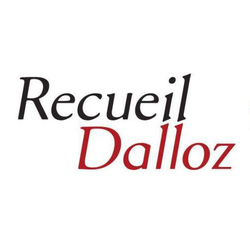
♾️ follow Marie-Anne Frison-Roche on LinkedIn
♾️ subscribe to the Newsletter MAFR Regulation, Compliance, Law
____
► Full Reference: M.-A. Frison-Roche, "La loi, la compliance, le contrat et le juge : places et alliances" ("Regulations, Compliance, Contracts, and Judges: places and alliances"), Chronique of Compliance Law, D. 2023, p. 906-908.
____
📝read the article (in French)
____
► English summary of this article: Compliance Law brings together the forces of regulations, contracts, and judges' decisions to achieve monumental goals so that in the future human beings will not be crushed by systems but will instead benefit from them. In this teleological and systemic branch of Law, legislators, regulators, companies, stakeholders, and judges must find their place. This can lead to bonds of obedience, a vision of 'conformity'. But conformity is only a tool of compliance, whose vigilance is the advanced point of this new branch of Law in which the alliance makes it possible to find solutions, the contract being then a usual mode of elaborating means under the control of the judge.
____
🚧read the bilingual Working Paper which is the basis of this article, with additional developments, technical references and hyperlinks
____
📚read the other articles published in this chronique of Compliance Law published in the Recueil Dalloz
________

May 4, 2023
Publications

🌐 follow Marie-Anne Frison-Roche on LinkedIn
🌐 subscribe to the Newsletter MAFR Regulation, Compliance, Law
____
► Full reference: M.-A. Frison-Roche, Use of private companies by Compliance Law to serve Human Rights, Working Paper, May 2023.
____
This Working Paper is the basis of:
🎤a conference done in French in Toulouse on June 16, 2023
____
►Summary of this Working Paper: Following the legal tradition, Law creates a link between power with a legitimate source, the State, public power being its prerogative, while private companies exercise their power only in the shadow of this public power exercised ex ante. The triviality of Economic Law, of which Competition Law is at the heart, consisting of the activity of companies that use their power on markets, relegates the action of the State to the rank of an exception, admissible if the State, which claims to exercise this contrary power, justifies it. The distribution of roles is thus reversed, in that the places are exchanged, but the model of opposition is shared. This model of opposition exhausts the forces of the organisations, which are relegated to being the exception. However, if we want to achieve great ambitions, for example to give concrete reality to human rights beyond the legal system within which the public authorities exercise their normative powers, we must rely on a new branch of Law, remarkable for its pragmatism and the scope of the ambitions, including humanist ambitions, that it embodies: Compliance Law.
Compliance Law is thus the branch of Law which makes the concern for others, concretised by human rights, borne by the entities in a position to satisfy it, that is to say the systemic entities, of which the large companies are the direct subjects of law (I). The result is a new division between Public Authorities, legitimate to formulate the Monumental Goal of protecting human beings, and private organisations, which adjust to this according to the type of human rights and the means put in place to preserve them. Corporations are sought after because they are powerful, in that they are in a position to make human rights a reality, in their indifference to territory, in the centralisation of Information, technologies and economic, human, and financial means. This alliance is essential to ensure that the system does not lead to a transfer of political choices from Public Authorities to private companies; this alliance leads to systemic efficiency. The result is a new definition of sovereignty as we see it taking shape in the digital space, which is not a particular sector since it is the world that has been digitalised, the climate issue justifying the same new distribution of roles (II).
________
🔓read the full developments below⤵️